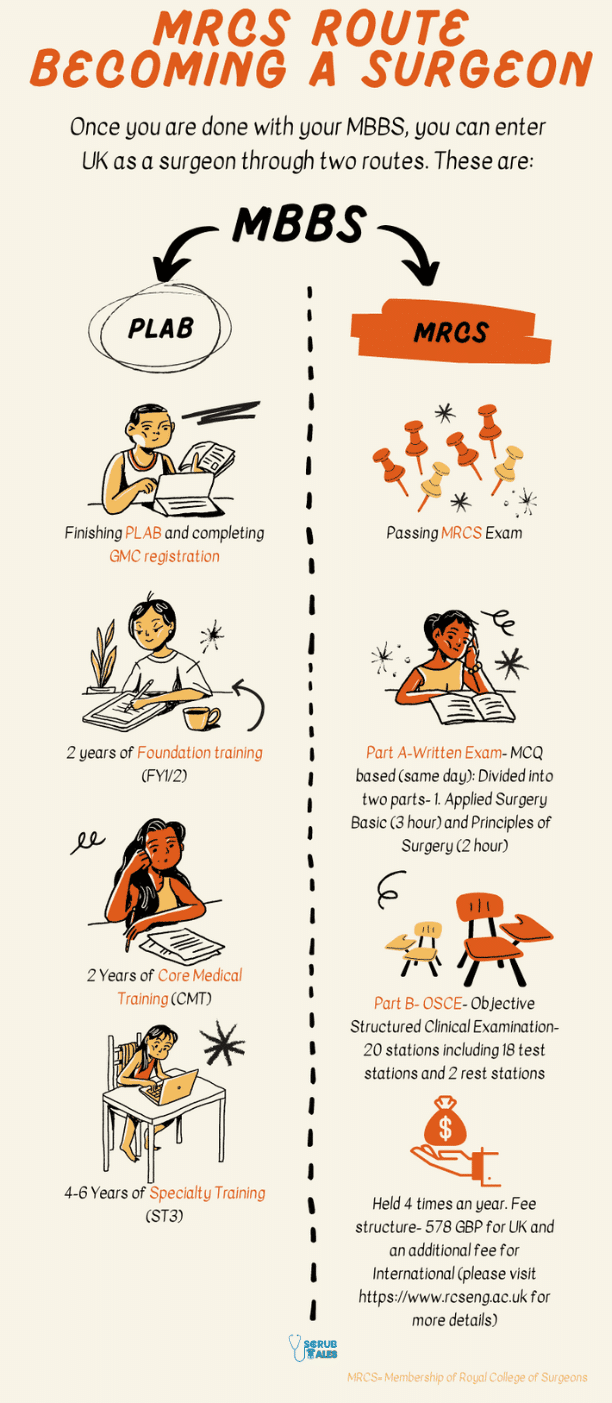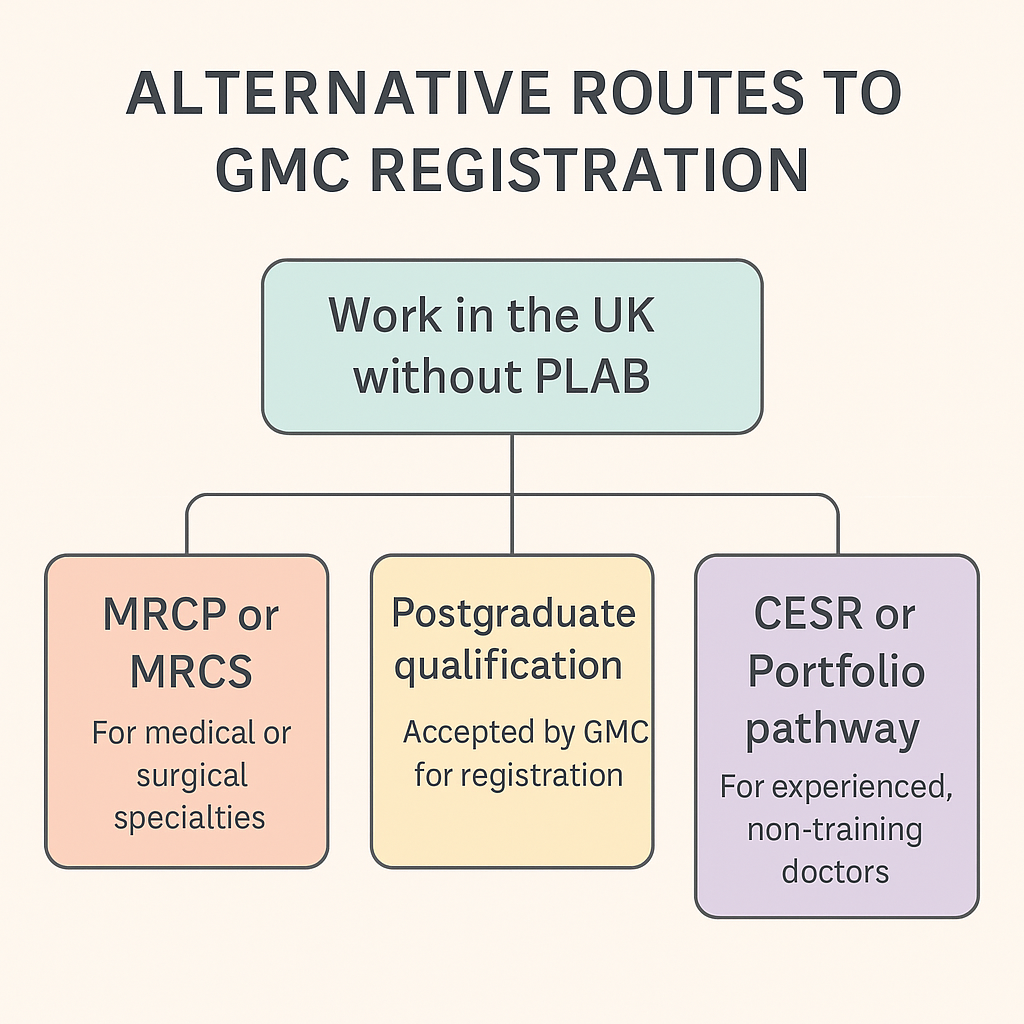First off – take a deep breath. “Failed PLAB 1”- This is more common than you think. The GMC reports that roughly 70–72% of candidates pass each year, which means about 28–30% don’t.
My journey hasn’t been smooth either:
- I failed IELTS three times
- Waited 12 weeks for my visa
- Left questions unanswered in the exam
- Knew deep down I hadn’t made it—even when people tried to reassure me
- Lost my job the day I returned from the UK
None of that was easy. But looking back, I realised that the reasons we tell ourselves to justify failure often become excuses. What matters isn’t the fall—it’s what we do after it.
Can You Get PLAB 1 Remarked?
A lot of candidates wonder if it’s possible to get PLAB 1 remarked—especially if they’ve missed the pass mark by just 1 or 2 points. The short answer is: not really, unless something went seriously wrong during the exam.
When can you request a review?
You can only appeal if there were clear, documented issues, like:
- An error in how the exam was conducted (for example, technical or admin problems)
- An unexpected or exceptional situation that affected your performance during the exam
When can’t you appeal?
Unfortunately, most common reasons don’t count:
- Feeling like your performance was under-marked
- Not fully understanding the exam rules or process
- Disagreeing with how a question was judged or marked
So in simple terms: You can’t request a remark just because you failed—even if it was by a single mark. The GMC doesn’t allow appeals based on how you feel the exam went or whether the score seemed unfair.
And honestly, as harsh as it sounds, I’ve never seen anyone pass PLAB 1 through a remark. Even those who missed it by just one mark understood that applying for a remark was more wishful thinking than a realistic option.

Instead of holding out for a miracle, your energy is better spent preparing for a stronger comeback next time. Many doctors have been there—and bounced back. You will too.
What if My OET or IELTS Is Expiring Before PLAB 1?
If your English test is set to expire before your next PLAB 1 date, you’ll need to rebook and retake it. The GMC only accepts valid test scores at the time of your exam, so if it expires even a day before, you won’t be allowed to sit PLAB 1.
Speaking from experience—I’ve been there too.
I failed IELTS three times, stuck at 6.5 in writing every single time, even though I scored 8 overall. It was frustrating and honestly felt like I was going in circles. I started feeling like a magnet for failure.
But the fourth time, with a bit of guidance and a clearer approach, I finally made it through.
So if your OET or IELTS is expiring, don’t delay—book a new slot right away. Failing once or twice doesn’t mean you won’t pass. Sometimes, it’s just about figuring out the right way to approach the test.
Should I Switch to MRCP Instead of Retaking PLAB 1?
It’s normal for this question to pop into your head after failing PLAB 1:
“Should I try MRCP instead? It also leads to GMC registration, right?”
I had the same thought.
But it didn’t take long to realise that MRCP is a completely different path—much harder, longer, and meant for those already heading into internal medicine. It requires starting from scratch with new study materials, a different exam format, and a much steeper learning curve.
If you genuinely feel MRCP is your calling, then sure, explore it. But if your goal is to simply register with the GMC and start practicing in the UK, PLAB is still the more straightforward route.

You’ve already invested time and effort into PLAB. Don’t throw it away just yet. Sometimes, one more push is all you need.
For me, as someone interested in surgery, I briefly explored the MRCS route—but ultimately decided to stick with PLAB and finish what I started.

Can I Work in the UK Without PLAB?
Yes, there are other ways to work in the UK without taking PLAB—but only if you still want to work as a doctor. If you are looking for non-medical jobs, stop and close your browser and sleep.

If your goal is NHS clinical practice, alternative routes include:
- MRCP or MRCS: For those aiming at physician or surgical specialties
- GMC-approved postgraduate qualifications: Some international qualifications are accepted directly for registration
- CESR/Portfolio pathway: For experienced doctors with evidence of training equivalent to UK standards (takes longer)
This Is How I Failed PLAB 1
I failed PLAB 1—and it wasn’t because I didn’t try hard enough.
I had gone through the syllabus eleven times, completed over 20 mock exams, tackled all six big mocks, and gave it everything I had. I used PLAB 1 Keys and PLABABLE as my core resources, trusting them completely throughout my preparation. In time, I even created my own set of concise notes that helped me with quick-fire revisions in the final days leading up to the exam.
But even with all that effort, I didn’t make it.
It was disheartening, no doubt. When you pour your heart into something and still fall short, it shakes you. But looking back, I realised that effort doesn’t always guarantee a pass—not because the work was wasted, but because the exam demands more than just repetition. It requires the right mindset, timing, exam-day strategy, and sometimes just a bit of luck.
This experience taught me that failure doesn’t mean you’re not good enough. It just means you’re not done yet.
And I wasn’t.
- Pass rates: Recent GMC data shows about 70% pass rate on PLAB 1. In other words, about 3 out of every 10 candidates fail. This might sound like a lot, but it means many candidates have to regroup and try again – and they do pass on the next attempt. You will too.
- Don’t blame yourself: Passing the first time is ideal, but not passing doesn’t mean you’re not smart or capable. PLAB 1 covers a broad range of medical knowledge and even very prepared doctors can slip up on test day (stress, tricky questions, time pressure, etc.).
- Gather feedback: If possible, reflect calmly on the exam experience. Was it a timing issue? Did certain topics trip you up? Understanding where things went off-course (without getting stuck there) can guide your study adjustments. Give yourself no more than 1 hour of analysis – then focus on solutions rather than the setback.
Feelings Are Valid – But Keep Perspective
It’s OK to feel upset. You worked hard and the result stings. But remember: many successful doctors failed an exam or two early in their careers. Medicine is full of challenges, and how you handle setbacks is what defines you.
Create a calm, organized study space for your comeback. A good environment helps shift from stress to action.
Try not to isolate yourself with worry. Sharing your feelings with friends, family or peers can ease the burden. Join an online group (for example, IMG or PLAB forums) where others share experiences. Just talking about it can be a relief.

- Stay active and healthy: Keep a routine that includes exercise, good sleep and hobbies. Pulling all-nighters and burning out will only harm your confidence and performance. In fact, experts warn that cramming without rest can cause productivity to plummet.
- Maintain confidence: Remind yourself that this is a temporary setback. You have the skills and knowledge – this exam is just another hurdle. Keep the goal in mind (working in the NHS, building your career) as motivation.
First Steps After Failing PLAB 1
When I saw the result, I felt lost. It was one of the most disappointing moments of my life. I kept asking myself—how did this happen? I was so well prepared.
But dwelling on it didn’t help. The more I replayed the exam, the more drained I felt. I realised there’s no point in stressing over something that can’t be changed.
So I made a decision: restart. The first thing I did was find the next available PLAB 1 date—and booked it.

If you’re in the same place, take a moment. Close your eyes, breathe, and focus on your next step. That’s how you move forward.
When the result comes, take a short break (a day or two), then switch into action mode. Here’s what to do:
- Look for cancelled slots: Don’t settle for a date that’s 8–12 months away. Keep checking for cancellation seats—you might get lucky and grab one sooner than expected.
- Keep revising: Since a closer exam date might appear suddenly, stay consistent with your prep so you’re not caught off-guard.
- Create ultra-short notes: Condense your PLABABLE and PLAB 1 Keys content into sharp, focused notes for quick revision.
- Sort your visa early: Make sure your PLAB 1 visa is valid and ready. Don’t confuse it with PLAB 2 visa guidance.
- Reflect—but briefly: Spend just an hour reflecting on why you might’ve failed. Was it time management? Weak topics? Panic? Be honest, but don’t dwell on it. Anything beyond an hour becomes counterproductive.
- Plan your comeback: Draft a proper study timetable tailored to your style. If you haven’t already, now’s the time to build one that suits your strengths and weaknesses.
- Check your IELTS/OET expiry: If it expires before your next exam date, rebook it in advance.
- Join PLAB groups: Facebook and WhatsApp groups often share real-time updates on cancellations, prep tips, and motivational support. Being part of a community makes the journey a bit easier.
Study Strategy for Your Next Attempt
Revise your study plan to cover any gaps and reinforce strengths. Make a detailed schedule leading up to the new exam date:
- Use diverse resources: Don’t rely on a single question bank. Combine sources like PLABable, PLAB 1 Keys, medical revision sites, and review books. Practice as many mock exams and questions as you can. Each will expose you to different styles and reinforce knowledge.
- Form or join study groups: Studying with others keeps you motivated and accountable. You can quiz each other, share difficult questions, and provide moral support. Even virtual study buddies (Zoom calls or chat groups) help. An IMG prep guide notes that “studying with others is both motivational and more sustainable”.
- Use online communities: Join Facebook or WhatsApp PLAB groups. They often share tips about upcoming test dates, tricky topics, or sudden cancellations. These free communities can also answer doubts and encourage you.
- Focus on weak areas: If there were question types or subjects you missed, allocate more time to them. Make concise summary notes or flashcards for quick revision. For example, writing “ultra-short notes” on key topics (like common pediatrics or infections) can help last-minute recall.
- Plan well and avoid burnout: As IMG Connect advises, get familiar with the syllabus early and use it to structure your study plan. Stick to the plan, study a bit each day, and don’t cram everything in the final days. Good planning also means scheduling breaks and rest. “Avoid leaving everything to the last minute and make sure you stay healthy and sleep properly during your preparations“.
Sample action list:
- Book next PLAB 1 date (or cancellation slot) – today if possible.
- Check and renew IELTS/OET and visa as needed.
- Draft a weekly study timetable covering all subjects.
- Make or update concise revision notes.
- Schedule in multiple mock tests under timed conditions.
- Join at least one PLAB discussion group for support and updates.
Dealing with GMC Requirements and Logistics
While you prepare for the exam content, keep an eye on practical requirements:
- Visa and travel: If you need a UK visa or travel arrangements, start those early for the new date. Rushing visa documents at the last minute is risky.
- GMC registration timeline: Remember that you must apply for GMC registration within two years of passing PLAB 2 followed by applying for NHS jobs on TRAC Jobs. Plan your long-term journey accordingly, but for now focus on clearing PLAB 1.
- Remarking or appeals: The GMC only allows exam appeals for strict irregularities (e.g. exam administration errors), not for a bad day or perceived unfair marking. Don’t waste time waiting for a remark – in practice very few succeed. Instead, channel energy into preparing for the next try.
What If I Failed PLAB 1 Four Times?
If you’ve failed PLAB 1 four times, it’s okay to feel disheartened—but don’t lose hope just yet (and yet I have never met anyone who actually failed 4 times- must be a miserable soul!).

You’re still allowed to make one final attempt—but only through a structured application process via the GMC. This isn’t automatic; you’ll need to:
- Fill out the structured application form (available on the GMC website)
- Show that you’ve had no significant clinical gaps
- Prove ongoing English language proficiency (valid IELTS or OET)
This is the GMC’s way of ensuring candidates are still clinically active and well-prepared for their final attempt. If you’re serious about continuing this journey, treat this fifth attempt like a fresh start—with sharper focus and structured preparation.
Remember, even after four setbacks, your story isn’t over. One more shot might just be the one that gets you through.
Alternative Routes to GMC Registration
After a disappointing PLAB attempt, you might wonder about other paths (like MRCP or MRCS). It’s good to know your options, but consider carefully:
| Pathway | Key Exams/Requirements | Pass Rate (Approx.) | End Goal |
|---|---|---|---|
| PLAB 1 & 2 (standard route) | PLAB 1 (MCQ) and PLAB 2 (OSCE) | ~70% pass for PLAB 1 | GMC Registration (licence to practice as doctor) |
| MRCP (Physicians) | MRCP Part 1, Part 2, PACES | Part 1 pass rate ~40–50%; Part 2 ~60–70% | Membership of Royal College + eligibility for GMC Registration |
| MRCS (Surgeons) | MRCS Part A, Part B (and OSCE) | Varies by specialty (often ~50–80%) | Membership of Royal College of Surgeons + pathway to GMC Registration |
| CESR/CESM (later) | Completed specialty training or equivalent | N/A (applicants must demonstrate competency) | Specialist or GP Register via GMC portfolio route- You will need CREST form for this. |

- MRCP: This route leads to being a member of the Royal College of Physicians. It’s meant for internal medicine specialists. It involves three tough exams – two written parts and a clinical exam (PACES). The early MRCP part 1 has a relatively low pass rate (around 40–50%). Even after passing MRCP, you still need to demonstrate experience for GMC registration. It’s a longer, more involved path than PLAB if you just want to register quickly. Furthermore, NHS job interviews just get tougher.
- MRCS: If surgery is your passion, MRCS (Royal College of Surgeons) exams (Part A and B) are the surgical equivalent. They also have moderate pass rates and require dedication. Passing MRCS can lead to GMC registration, but like MRCP it’s a different career trajectory.
- Stick or switch? If your main goal is to practice medicine in the UK and you’ve already put effort into PLAB, it might make sense to stick with PLAB. The author of the original post also advises: if you’ve already invested a lot into preparing for PLAB 1, give it another shot before switching tracks. Changing to MRCP/MRCS means starting over with new study material and timelines.
Ultimately, choose the path that fits your passion and timeline. But remember: Your current PLAB investment isn’t wasted. A bit more push might still get you through this route.
Keep doing things such as audit, research, or CPD courses to improve your chances of getting job interview.
Staying Positive and Moving Forward
Remember: failing one exam does not define your career. It’s just a hurdle. Use this experience to come back stronger. Here are some final tips to keep you on track:
- Set realistic daily goals: Each day, aim for a specific target (e.g. finish a topic, do 50 practice questions, revise notes). Achieving these will rebuild your confidence bit by bit.
- Reward progress: Celebrate small wins (e.g. scoring higher on a mock test, mastering a tough topic) to stay motivated.
- Stay connected: Keep in touch with supportive peers and mentors. They can remind you of your strengths and encourage you on tough days.
- Keep perspective: Many top doctors have stories of early failures. In fact, enduring and overcoming challenges is often what makes a stronger doctor. You’re learning resilience now.
- Action over anxiety: Replace thoughts like “What if I fail again?” with a checklist of actions: “Today I will revise cardiology, do 3 mock tests, and check exam dates.” This keeps your mind focused on solutions.

Above all, be kind to yourself. You’ve worked hard to reach this point. Use this setback as fuel, not as a ceiling. With a clear plan and steady effort, the next time you sit PLAB 1, you will be more prepared – and more confident.
You can do this. Each day of preparation brings you closer to passing. Take it one step at a time, stay focused on your goal, and keep going. There are brighter days (and a PLAB pass) ahead!
Final Thoughts: What Failing PLAB 1 Taught Me
Failing PLAB 1 hits hard. It’s not just about an exam result—it shakes your confidence, your routine, even your sense of direction. The world suddenly feels heavier, and facing others is tough. But often, it’s even harder to face ourselves.
So, to anyone who failed PLAB 1:
Don’t get stuck in “why me?”—start asking “what next?”
The comeback matters more than the setback.
Yes, it hurts. Yes, it feels unfair. But you still have a shot—and maybe that next attempt is the one that changes everything.
You’re not finished. You’re just getting started.


